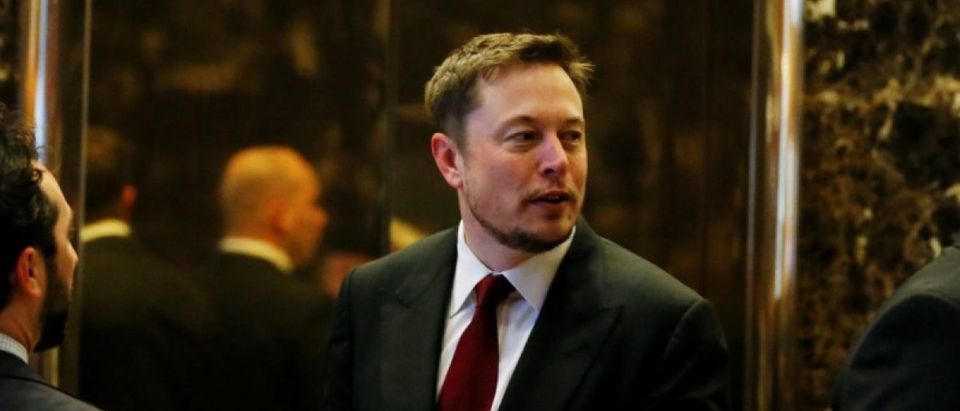Media outlets are praising Tesla for overcoming Ford to become one of the largest automakers in the industry, but some analysts warn the electric car company’s market value is hollow.
Tesla is benefiting from investors with little knowledge about electric cars, who are driving up the California-based company’s stock because it’s the cool thing to do, according to Philip Davis, a co-founder of PSW Investments.
He believes the company’s fan club doesn’t care or realize that companies like General Motors and Ford dwarf Tesla’s productive capacity by multitudes. The electric company’s followers simply dump a lot of money on it because they want the newest toy, Davis told The Daily Caller News Foundation.
“It’s ridiculous,” he added, because GM and Ford make more cars in one week than Tesla has in a year – to pretend that they are comparable in any way is “crazy,” he added. The two Detroit gold standards produced more than 1 million vehicles in 2016; Tesla sold 80,000.
Still, the maker of the Model S and forthcoming Model 3 saw its capitalization surge dramatically earlier this week to about $48.2 billion, $3.1 billion more than Ford, the second largest auto company behind GM. Tesla CEO Elon Musk, for his part, bragged about the accomplishment Monday on Twitter and mocked analysts who shorted the company earlier this year.
Musk, who owns 20 percent of the company, has promised to deliver between 100,000 and 200,000 Model 3s to the market in the second half of 2017, despite Tesla’s paltry showing last year. He must produce more than 40,000 Model 3s a month to keep that promise – a tall order, Davis and others say, considering Tesla managed to produce only 25,000 cars during the first three months of this year.
Musk’s devotees are not phased and neither are media. Several outlets are suggesting the automaker’s achievement shows that the public is leaving Detroit behind for Silicon Valley. The New York Times, for one, reported Monday that Tesla just proved Wall Street sees the electric car as the wave of the future.
Yet, there are signs the valuation is built on shifting sands, Davis argued.
“The problem is that people don’t understand the stocks they buy. People don’t understand production or anything … they just hear about Tesla being cool, so they think maybe it’s worth buying,” he said.
“It’s all meant to cloud the financials. First, he makes the gigafactory, which gave him the excuse to raise another $2 billion. Then he purchased SolarCity, which gave him another capital boost,” Davis said about Tesla’s recent decision to build a giant facility in New Mexico and merge with SolarCity, another Musk entity.
SolarCity’s bedraggled financials have hurt the ability to place a value on the car-producing side of the company.
The solar panel provider, which leases its panels to customers, has reached long-term lease agreements with homeowners before they defaulted on the mortgages, according to a Feb. 22 report from The New York Times. There could be even more default cases, the report notes.
The merger and frenzied activities, Davis added, make it more difficult for any investor to value this company, because it creates a smokescreen meant to avoid determining Tesla’s actual value.
Matt Stack, the co-founder of tech investment firm Devonshire Research Group, mirrored Davis’s sentiments, but added that Wall Street will eventually hold Musk accountable for leaping from one venture to another.
“We don’t think Elon Musk is acting like a mature CEO,” Stack told TheDCNF. “He’s pivoting, getting distracted, and doing things that most small tech startups do.” Musk should convince Wall Street investors that he is serious about Tesla and its ability to produce vehicles – if he continues bouncing around, Stack added, then the company’s recent fortunes will be short-lived.
Analysts who were otherwise bullish on Musk’s entities began shorting the auto company last month, partially because of the company’s financial problems.
David Tamberrino, an analyst with Goldman Sachs, for instance, wrote in a memo that Tesla has done good work on producing electric vehicles, but “our concerns are more near-term oriented with respect to operational execution on the Model 3 launch, an unproven solar business, and cash needs.”
Tamberrino was also worried the company would have to sell stock to raise $1.7 billion to make room for a possible loss if the Model 3 doesn’t make the grade. The financial institution ultimately downgraded the company from “neutral” to “sell.”
Follow Chris White on Facebook and Twitter
All content created by the Daily Caller News Foundation, an independent and nonpartisan newswire service, is available without charge to any legitimate news publisher that can provide a large audience. All republished articles must include our logo, our reporter’s byline and their DCNF affiliation. For any questions about our guidelines or partnering with us, please contact licensing@dailycallernewsfoundation.org.


